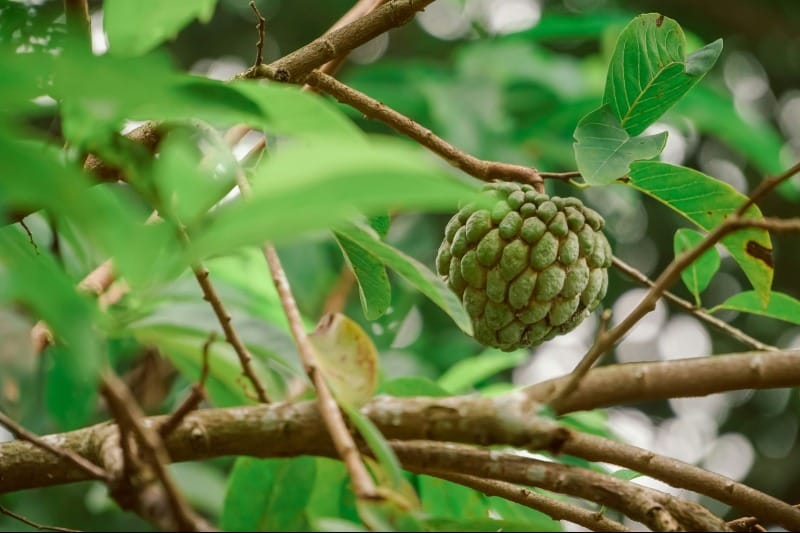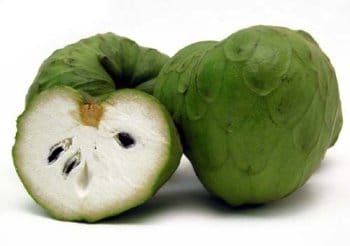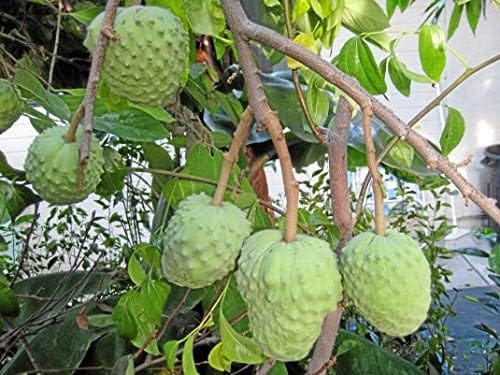Imagine biting into a fruit that tastes like a delightful blend of banana, pineapple, papaya, and strawberry, all wrapped up in a creamy, custard-like texture. This isn't a fantasy fruit – it's the cherimoya, a lesser-known tropical delight that's not only delicious but also packed with potential health benefits. Native to the Andean valleys of South America, this heart-shaped fruit with its scaly green exterior is making waves in the health food community for its impressive nutritional profile and possible medicinal properties.
Key Takeaways
- Cherimoya is rich in antioxidants, which may help protect against chronic diseases.
- The fruit is a good source of fiber, supporting digestive health and regularity.
- Cherimoya contains vitamins and minerals that may boost immunity and eye health.
- Its nutrients may contribute to heart health by helping to lower blood pressure.
- While generally beneficial, cherimoya should be consumed with caution due to potentially toxic compounds in its seeds and skin.
What is Cherimoya?
Cherimoya, scientifically known as Annona cherimola, is a tropical fruit that belongs to the custard apple family[1]. Often called the "custard apple" due to its creamy texture, this fruit has been cultivated for centuries in its native regions of Ecuador and Peru. Today, it's grown in various warm climates around the world, including parts of Spain, New Zealand, and California.
The fruit typically weighs between 150 to 500 grams and has a green, scaly exterior that gives way to a white, creamy flesh dotted with large, inedible black seeds. Its unique flavor is often described as a mix of several tropical fruits, making it a favorite for eating fresh or incorporating into desserts and smoothies.
Nutritional Profile of Cherimoya
Before we dive into the health benefits, let's take a look at what's inside this tropical treasure. A one-cup serving (160g) of raw cherimoya provides[1][4]:
- Calories: 120
- Protein: 2.5g
- Carbohydrates: 28.3g
- Fiber: 4.8g (17% of Daily Value)
- Fat: 1.09g
- Vitamin C: 20.2mg (22% of DV)
- Potassium: 459mg (10% of DV)
- Vitamin B6: 0.55mg (24% of DV)
Cherimoya is also a good source of other B vitamins, including thiamine, riboflavin, and pantothenic acid, as well as minerals like copper[1].
Health Benefits of Cherimoya
1. Rich in Antioxidants
One of the standout features of cherimoya is its high antioxidant content[1][3]. Antioxidants are compounds that help protect our cells from damage caused by free radicals, which are unstable molecules that can lead to chronic diseases and premature aging when left unchecked.
Cherimoya contains various types of antioxidants, including:
- Flavonoids
- Carotenoids
- Vitamin C
These antioxidants work together to neutralize free radicals, potentially reducing the risk of chronic diseases like heart disease and certain types of cancer. However, it's important to note that while laboratory studies show promising results, more research is needed to fully understand how these antioxidants work in the human body.
2. Supports Digestive Health
With nearly 5 grams of fiber per cup, cherimoya is an excellent source of dietary fiber[1][3]. Fiber is crucial for maintaining a healthy digestive system. It helps:
- Promote regular bowel movements
- Prevent constipation
- Support the growth of beneficial gut bacteria
A healthy gut is linked to numerous health benefits, including improved immune function and a reduced risk of colon cancer. By incorporating fiber-rich foods like cherimoya into your diet, you're taking a step towards better digestive health.
3. Boosts Immune Function
Cherimoya is a good source of vitamin C, providing about 22% of your daily needs in just one cup[1]. Vitamin C is well-known for its immune-boosting properties. It helps:
- Stimulate the production and function of white blood cells
- Enhance the body's ability to fight off infections
While vitamin C supplements are popular, getting this nutrient from whole foods like cherimoya ensures you're also benefiting from other nutrients and fiber that work synergistically in the body.

Tropical Cherimoya Fruit
Bulk 8 Lb Case for Culinary Professionals, Exotic Blend of Pineapple, Papaya, & Banana Flavors, Ideal for Creative Chefs & Gourmet Dishes
4. Supports Eye Health
The carotenoids found in cherimoya, particularly lutein, may contribute to eye health[1]. Lutein accumulates in the retina, where it can help:
- Reduce inflammation
- Protect against oxidative stress caused by blue light and UV rays
Some studies suggest that diets high in lutein may help protect against age-related eye conditions like cataracts and macular degeneration. While cherimoya alone isn't a cure-all for eye problems, including it as part of a varied, nutrient-rich diet may contribute to overall eye health.
5. May Support Heart Health
Several nutrients in cherimoya may contribute to heart health[1][2]. The fruit's fiber content can help lower cholesterol levels, while its potassium content may help regulate blood pressure. Potassium works by:
- Counteracting the effects of sodium in the body
- Easing tension in blood vessel walls
The American Heart Association recommends consuming 3,500-5,000 mg of potassium daily to prevent or treat hypertension. With 459 mg of potassium per cup, cherimoya can be a tasty way to help meet this recommendation.
How to Enjoy Cherimoya
Now that you know about the potential health benefits of cherimoya, you might be wondering how to incorporate it into your diet. Here are some tips:
- Eat it fresh: The simplest way to enjoy cherimoya is to cut it in half and scoop out the flesh with a spoon. Many people prefer to chill the fruit first for a refreshing treat.
- Add to smoothies: Blend cherimoya into your morning smoothie for a creamy, tropical twist.
- Use in desserts: Its custard-like texture makes cherimoya perfect for puddings, ice creams, and other desserts.
- Pair with other fruits: Try mixing cherimoya with other tropical fruits in a fruit salad.
Remember to always remove the seeds and skin before consuming, as these parts contain potentially toxic compounds[1].
Precautions and Considerations
While cherimoya offers many potential health benefits, there are a few things to keep in mind:
- Toxic seeds and skin: The seeds and skin of cherimoya contain acetogenins, which can be toxic. Always remove these parts before eating[1].
- Potential link to neurological conditions: Some studies have suggested a possible link between long-term consumption of acetogenin-containing fruits and neurological conditions like Parkinson's disease. If you have a neurological condition, consult with your healthcare provider before adding cherimoya to your diet[1].
- High in potassium: While potassium is beneficial for most people, those with kidney problems or on certain medications may need to limit their intake. If you're on a potassium-restricted diet, talk to your doctor before eating cherimoya[1].
Conclusion
Cherimoya is more than just a delicious tropical fruit – it's a nutrient-dense food that may offer several health benefits. From its high antioxidant content to its potential to support digestive, heart, and eye health, cherimoya is a worthy addition to a balanced diet. As with any food, it's best enjoyed as part of a varied diet rich in fruits, vegetables, whole grains, and lean proteins. While more research is needed to fully understand all of cherimoya's potential health effects, its impressive nutritional profile makes it a fruit worth trying. So why not add a little tropical flair to your next meal or snack with this creamy, sweet "custard apple"?
Citations:
[1] https://www.webmd.com/diet/health-benefits-cherimoya
[2] https://www.healthline.com/nutrition/cherimoya
[3] https://fdc.nal.usda.gov/fdc-app.html
[4] https://greg.app/cherimoya-benefits/
[5] https://www.medicinenet.com/8_surprising_benefits_of_cherimoya_custard_apple/article.htm















Member discussion